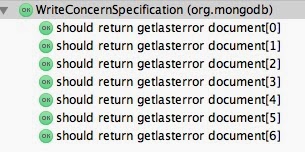The second in my short series of blogs about the new Java driver is now available for your perusal. In it, there's some guidance on how to get started using the new driver, whether you want to use the new (unfinished) API, the existing "classic" API, or a blend of both. The post also shows that Gradle is prettier than Maven . Sorry Maven. If you are going to play with the new driver, please read all the caveats carefully. I know it looks a bit like the warnings on your prescription medicine, but it serves the same purpose. Short version: the driver is not finished yet, and should not be used in production. We really want to hear your experiences with the driver - it is an open source project and MongoDB is very much driven by the community, we want to hear from you. But only if you say nice things. No, seriously, please tell us if you have problems, if functionality is missing, if your tests fail if you start to use it, etc etc etc. Go play.






